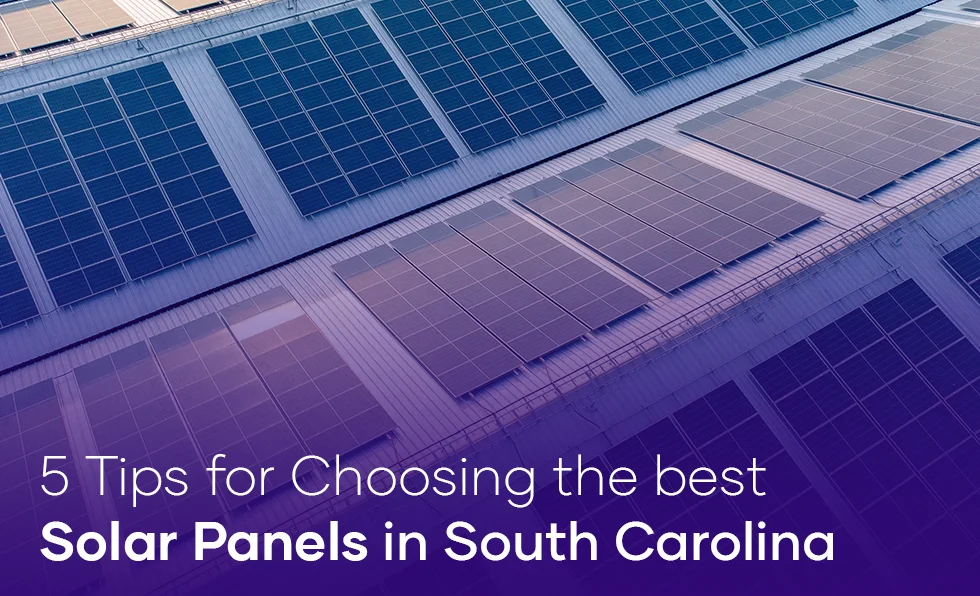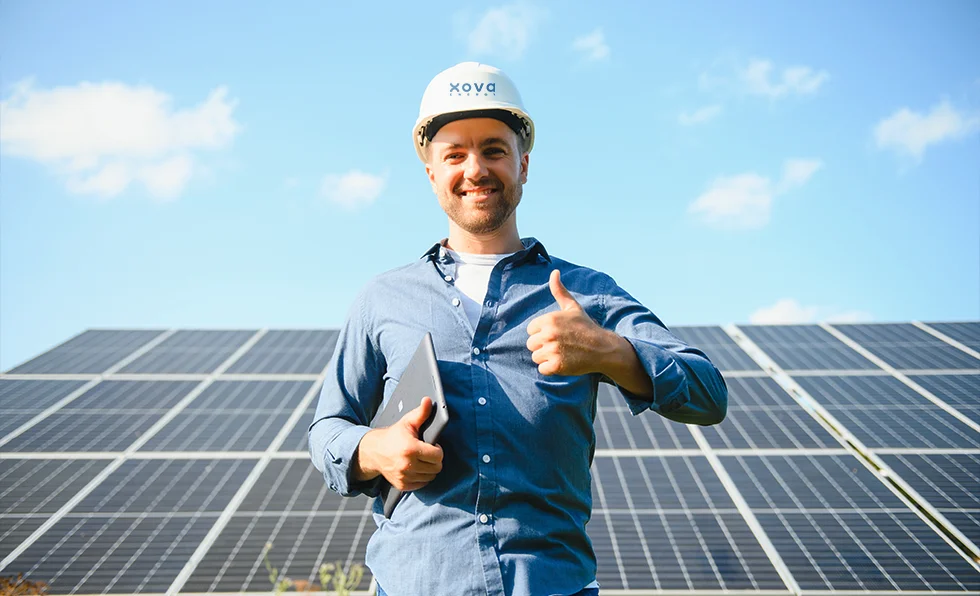
1. Increase Efficiency Before Installing Residential Solar South Carolina
Before you even begin looking for solar panels, evaluate the condition of your property and adapt some measures for energy-efficient homes in South Carolina. Because an energy-efficient property consumes less power, it is possible to install a smaller solar system, which will ultimately result in cost savings.
Why Energy Efficiency Matters
Energy optimization ensures that the efficiency of solar panels (electricity produced with solar panels) isn’t wasted. This happens when you have leaky ductwork, poor insulation, or inefficient appliances. Therefore, cost-effective solar panels reducing your energy consumption bring several advantages, like lowering your initial solar installation costs and maximizing the return on your investment over time.
Energy Savings Tips
Here are some easy, cost-effective ways to improve your home’s energy efficiency:
- Adjust Thermostat Settings: For winter, set the temperature to 68°F, and for summer, set it to 78°F. Take into account the utilization of programmable or smart thermostats to optimize energy consumption during your absence.
- Seal and Insulate: Seal any cracks or gaps around doors, windows, and other openings with caulk and weather stripping. Simply upgrading the insulation in your attic can enhance climate control.
- Replace Bulbs: Consider replacing old bulbs with energy-efficient LEDs, which have a longer lifespan and consume up to 75% less energy.
- Maintain HVAC Systems: Maintain your air conditioner by changing the filter often, keeping the vents clear, and having professional maintenance done once a year.
- Optimize Water Heating: The temperature of your water heater should be reduced to 120 degrees Fahrenheit, and appliances should only be run when they are full.
Your solar system will become more cost-effective if you implement these measures because they will reduce the amount of energy that you consume.
2. Assess Roof Solar Panel compatibility
The supportive structure of a house for the durable installation of panels is necessary when it directly depends on the performance of your photovoltaic cells. Therefore, it has a significant effect on your roof’s condition, orientation, and shading. Proper evaluation is essential to ensure your system operates at peak efficiency.
Roof Condition
The favorable condition of the roof for the solar panel installation considers factors such as age, material, and structural strength. Solar panels typically last 25–30 years, so your roof should be in good condition to support them. If your roofing materials are getting close to the end of their lifespan, such as older ones that have been around for more than 15 years, you should think about replacing them before installation.
Roof Orientation and Tilt
The efficiency of your solar panels is highly dependent on the orientation and tilt of your roof. To achieve the optimal energy production, your roof should ideally be oriented so that it faces south and should have a tilt angle that corresponds to your latitude. South-facing roofs are ideal for solar panels in South Carolina, as they receive the most sunlight throughout the day. Southeast- and southwest-facing roofs can also work well, but east- or west-facing systems may experience reduced performance.
Shading Considerations
Shading from trees, chimneys, or nearby buildings may have a critical effect on your solar panel efficiency. Your solar installers in South Carolina evaluate the potential shading concerns for a whole year during the site assessment with software to ensure maximum energy production. Ground-mounted systems are an alternative if your roof is heavily shaded.
Space Requirements
The amount of sunlight your home receives will affect how much power you can generate. A typical solar panel system requires about 50-100 square feet of unshaded roof space per kilowatt (kW) of electricity. Although smaller systems can only partially meet your energy needs, larger systems can cover most or all of your electricity needs.
3. Selecting the right South Carolina solar panels
Solar panels are becoming more efficient as they are producing more power per square foot. When looking for solar panels, consider the efficiency rating, warranty, and cost to ensure you are getting the best value for your investment. Additionally, it is important to consider the durability and aesthetics of the solar panels to ensure they will last and complement your home.
Access energy requirements
It is essential to determine your energy requirement prior to installing a solar system; calculate your demand and consumption so you can make an informed decision. When you know your energy requirement, it will help you figure out the size and number of panels needed to meet your needs. This maximizes energy advantages and saves money over time.
Use our solar panel calculator to see what your power requirements are and an estimation of cost-effective solar planning.
Evaluate Costs and Quality
When considering the installation of solar panels in South Carolina, the state’s electricity rates, according to the U.S. Energy Information Administration (EIA), as of September 2024, are:
- Residential: 13.68 cents per kilowatt-hour (kWh)
- Commercial: 10.39 cents per kWh
- Industrial: 6.68 cents per kWh
These rates are slightly below the national averages, which are 16.83 cents per kWh for residential, 13.47 cents per kWh for commercial, and 8.51 cents per kWh for industrial sectors.
These values affect the average cost of solar panels in South Carolina. Which varies according to requirement.
There are many types of solar panels, Monocrystalline, Polycrystalline Panels and Thin-Film Solar Cells with distinct efficiency ratings and price points. Take into account the upfront cost and long-term electricity bill savings. Afterwards you decide on the best option for your specific needs and budget.
Consider Performance Metrics
Consider the durability of the power systems; a long lifespan to ensure optimal performance over the years. .When you invest in higher-quality solar panels, you are likely to see a greater return on investment (ROI) in terms of energy savings and overall performance. Additionally, look for panels with high efficiency ratings to maximize energy production for your home.
Check Warranty Coverage and Research Brand Reputation
Conduct a thorough examination of the warranty coverage. Manufacturers of green panels guarantee that you are safeguarded in the event that any problems arise. That’s why researching the reputation of the brand can also give you insight into the quality and reliability of their products. Consider these factors to choose the best solar panels for your home.
4. South Carolina solar panel incentives program
The state is determined to encourage homeowners to adopt renewable energy. That’s why there is the South Carolina solar panel program to cut upfront and long-term costs. Furthermore, solar power South Carolina residential grants include tax credits, rebates, and net metering programs.
Several federal, state, and local solar incentives are available.
South Carolina solar incentives scheme
- Federal Solar Investment Tax Credit (ITC):
Because of this, homeowners are able to deduct 30% of the costs associated with installing power panels from their federal taxes. - Solar panel tax credit South Carolina:
Renewable power installations are eligible for an additional tax credit of 25% from the state, which can be applied over a period of ten years after installation. - Net Energy Metering (NEM):
Net metering allows homeowners to earn credits for the excess energy that is generated from their power panels, which further reduces the amount of money that is spent on electricity bills. - Local Utility Rebates:
Solar power incentives South Carolina local utility providers offer additional rebates; with these, residents can lower their monetary costs for renewable energy through the financing of solar panel installations.
Why These Incentives Matter
These programs lower solar panel prices and speed up payback. The federal and state tax credits can cover over half of your power installation. However, always consult with a tax advisor to ensure you qualify for these benefits.
How to Apply
Renewable energy experts help with tax credits and net metering applications. Some utilities also offer rebates, so be sure to ask your provider about additional savings opportunities.

5. Choose a Reliable Solar Installer
Selecting a certified and experienced green power installer ensures your system is designed and installed correctly. This maximizes energy production and ensures optimal system performance for years. Additionally, a reliable installer can provide valuable maintenance and warranty services and will also handle permits, interconnection agreements, and tax credit documentation on your behalf.
What to Look for in an Installer
- Certifications:
Get certified installers if you want high-quality work. - Experience:
To navigate incentives and regulations, choose a South Carolina consultant with experience. - Warranties:
For both equipment and labor, make sure your installer offers warranties.
Questions to Ask
- How much energy will my system produce?
- What maintenance is required?
- Can you help me apply for tax credits and rebates?
- What financing options do you offer?
Working with a professional installer like Xova Energy guarantees that your clean energy system will be installed correctly and efficiently. Additionally, they can provide ongoing support and maintenance to ensure optimal performance of your system.
Final Thoughts
Choosing the right solar panels for your South Carolina home requires careful consideration of your energy needs, roof suitability, incentives, and installer. With these five tips, you can maximize your savings and contribute to a greener future.
At Xova Energy, we specialize in helping South Carolina homeowners transition to clean energy solutions that are tailored to their specific needs and goals. Contact us today for a free consultation and discover how we can customize a solar solution for your home!
FAQs
Are free solar panels in South Carolina available?
Free solar panels in South Carolina are not common, but there are various incentives and financing options available to help offset the cost. It is recommended to consult with a reputable clean energy provider like Xova Energy to explore all available options for making the switch to solar power.
Are solar panels worth it in South Carolina?
Absolutely! With plenty of sunshine, attractive incentives, and rising electricity costs, solar panels are a smart investment for South Carolina homeowners. Here’s what you can expect:
- Savings:
You can reduce or eliminate your electricity bill. Cost savings for many homeowners are achieved over the system’s lifespan. - Eco-Friendly Power:
It lessens your carbon footprint; thereby, it contributes to the mitigation of climate change. - Increased Home Value:
Homes with rooftop panels sell more quickly and at a higher price than homes that do not have green panels.
What is the average cost of solar panels in South Carolina?
The installation prices range from $3 to $5 per watt; it also depends on the system type and installer. Although the cost of sustainable power generation is high, incentives and financing help bring the price down. Federal Tax Credit 30% and State Tax Credit 25% are available in South Carolina, making solar panel installation more affordable for homeowners.
More questions? Schedule a quick chat with our team!
